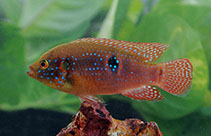| Family: |
Cichlidae (Cichlids), subfamily: Pseudocrenilabrinae |
| Max. size: |
13.6 cm SL (male/unsexed); max.weight: 10.0 g |
| Environment: |
benthopelagic; freshwater; brackish; pH range: 6.5 - 7.5; dH range: 4 - 16, potamodromous |
| Distribution: |
Africa: widely distributed in West Africa, where it is known from most hydrographic basins (Ref. 53405), associated with forested biotopes (Ref. 5644, 52307). Also reported from coastal basins of Cameroon, Democratic Republic of the Congo and Nile basin (Ref. 7378), but at least its presence in Cameroon is unconfirmed in Ref. 81260. Ref. 52307 limits this species to Guinea, Sierra Leone and Liberia. Species boundaries in the genus Hemichromis remain unclear (Ref. 81260). |
| Diagnosis: |
Dorsal spines (total): 14-15; Dorsal soft rays (total): 10-12; Anal spines: 3-3; Anal soft rays: 8-9. Diagnosis: 3 black blotches on sides, the first on opercle, the second at midpoint of body, the third on caudal-fin base; upper profile of snout convex or straight (Ref. 53405).
Description: body ovoid; lower jaw scarcely prominent in large individuals; outer and inner jaw teeth monocuspid, inner teeth forming an incomplete row on upper jaw and 2 incomplete rows (only medially) in lower jaw; pharyngeal jaw teeth bicuspid; micro-gillrakers present; scales cycloid (Ref. 53405).
Coloration: ground colour olive-brown, with 3 black blotches on either side, first on gill cover, third on caudal-fin base; head with yellow or blue spots forming bands on cheeks and opercular region (sometimes continuing unto sides); opercular spot with green margin; lips and chin reddish; dorsal fin red-edged, with light submarginal band; anal fin light anteriorly, reddish posteriorly; proximal part of caudal fin yellowish, distal part bright red; upper margin of caudal fin red, with light submarginal band; pectorals transparent, hyaline or yellow; pelvics light, their anterior margin red or black (Ref. 53405). |
| Biology: |
Occurs in mud-bottomed and sand-bottomed canals (Ref. 5723); some distance inland from the coast, associated with areas of intact or recently disturbed forest cover. Considered the true 'jewel fish' of aquarists, this species is also used as an experimental animal by physiologists and ethologists (Ref. 5644). Attains a maximum of 12 cm in captivity. Aquarium keeping: aggressive; in pairs; minimum aquarium size 100 cm (Ref. 51539). |
| IUCN Red List Status: |
Least Concern (LC); Date assessed: 01 January 2020 Ref. (130435)
|
| Threat to humans: |
harmless |
Source and more info: www.fishbase.org. For personal, classroom, and other internal use only. Not for publication.

